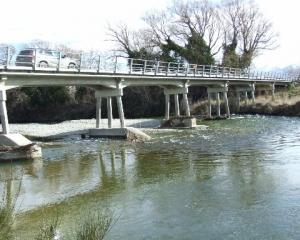Canterbury suffered the earthquake but Auckland got the bargains. Second was the Auckland-based Environmental Defence Society (EDS), with Wellington headquartered Forest and Bird, coming south to explain why the Mackenzie's working landscape must have restrictive controls slapped upon it.
Many have the impression EDS/Forest and Bird see themselves as civilising agents, coming south to teach us uncouth yokels a thing or two about environmental obligations. Job done, they utter, "Veni, vidi, vici" - I came, I saw, I conquered - before boarding their flights back north.
Afterwards, they'll laugh at how they couldn't get a decent ristretto in the High Country. These people love the Mackenzie so much, that's why they mostly live elsewhere.
So the great 2010 imposium is over. Is Federated Farmers worried about its boycott? Only that one was needed. Few in the media stopped to ask: "Does the Mackenzie need saving by North Island environmentalists or does it need saving from them?"
After the talking, farmers and farm workers will get up and go to work. That work entails a huge commitment to keeping rabbits, hieracium and wilding pines under control.
We work to generate food and fibre that is exported, helping New Zealand pay for healthcare, education and services that a first world nation expects. After the talking, we're still in the Mackenzie but those who wish to sa it aren't.
I also wonder how Auckland would react if Federated Farmers turned up in the Queen City to run a two-day symposium on saving Auckland, with urban representatives only allotted the final hour of the final day. Somehow, I think one or two noses would be put out of joint.
Many of us have an interest in the future of the Mackenzie Basin, especially the good folk who live and work there. But in all of its majesty, you cannot but help notice Meridian's electricity infrastructure and that reminds us that the Mackenzie, when all is said and done, is a modified working landscape.
Maori and Pakeha influences created the Mackenzie we know today, not nature. Forest and Bird may claim the Mackenzie is a natural desert but that's fantasy. Without farming, the Mackenzie would be condemned to a slow death by hieracium and wilding pines.
Because farmers will be forced off the land, those areas not covered in pine trees and weeds would suffer desertification after an explosion in rabbits.
Bumper sticker slogans, like Forest and Bird's "Keep the Mackenzie Brown", is short on reality. No irrigation, no taking of water for new farming ventures or initiatives locks down all pastoral leases in their current state, or less.
Keeping weeds and pests under control isn't easy because clean and green costs money. Even the Department of Conservation struggles to manage weeds and predators and it's no different for farming families. You cannot be green if you're constantly in the red.
So come next year, a fresh start is needed and Federated Farmers will provide it through collaborative engagement modelled on the Land and Water Forum process.
The difference is that we won't pay lip service to the process. Part of this is a realisation that environmental and landscape issues are extremely complex. You cannot start by fudging council boundaries as EDS/Forest and Bird did. Being honest is a realisation that the best way of saving the Mackenzie is through economically viable farms.
It also demands that EDS/Forest and Bird get over their extreme agenda to deprive farming leaseholders of their legal land rights.
Yet what's needed is a celebration of the role farmers perform as environmental stewards - from pest control to the thousands of hectares voluntarily protected by QEII National Trust covenants. That tells me we need a lot more than one hour. It also tells me that while others talk, farmers get on and do.
The Mackenzie farming community is also engaged in dialogue with Government at all levels. We're a committed participant in the plan change 13 process, now awaiting an Environment Court decision. It's why holding that symposium before the outcome of this RMA process is, I believe, an attempt to influence due process.
For 150 years we have cared for the landscape we live in. It's why local landowners, farmers and residents all support realistic protection. We know a community can marry the best parts of conservation with economic development.
• Donald Aubrey is vice-president of Federated Farmers and a high country farmer.




